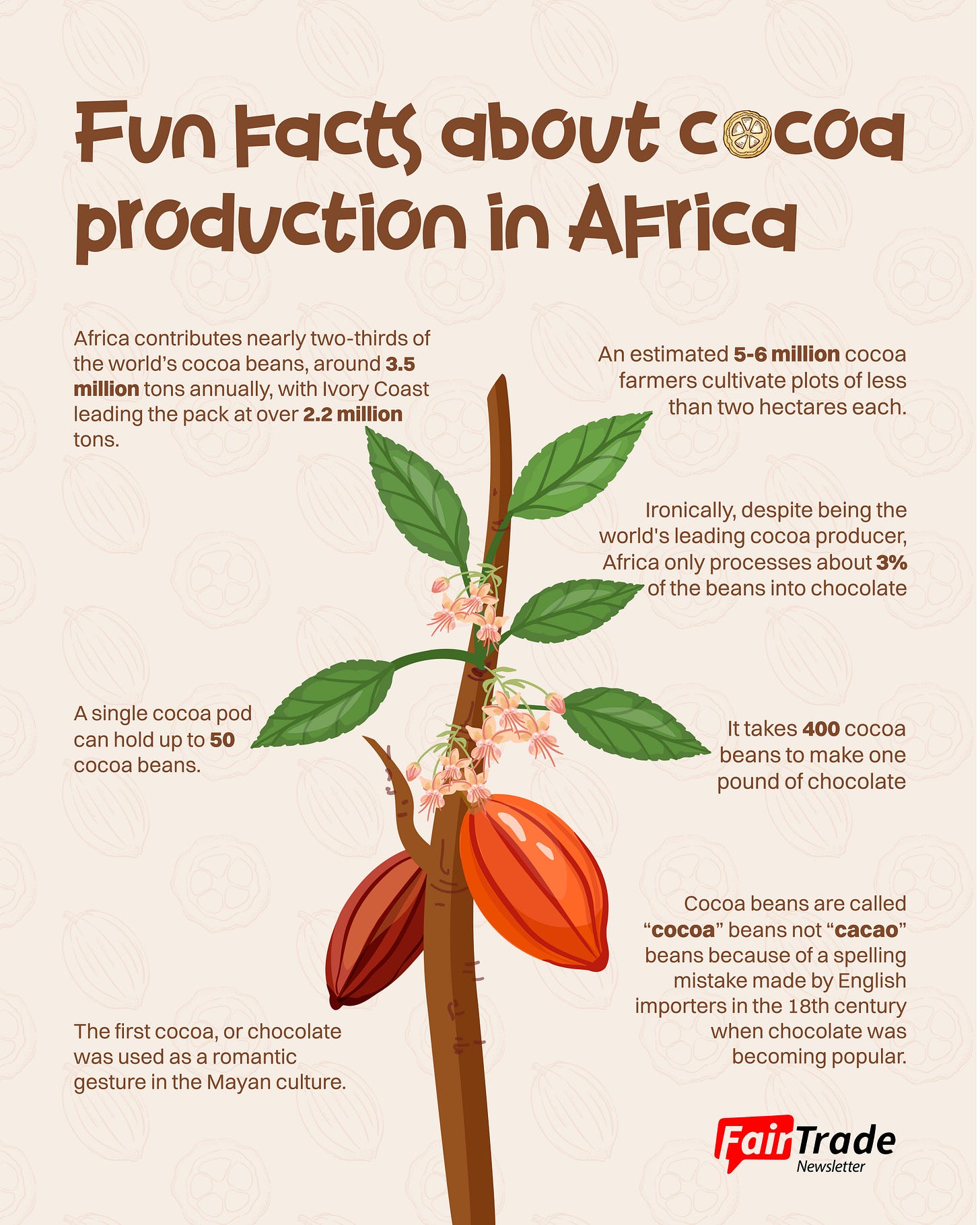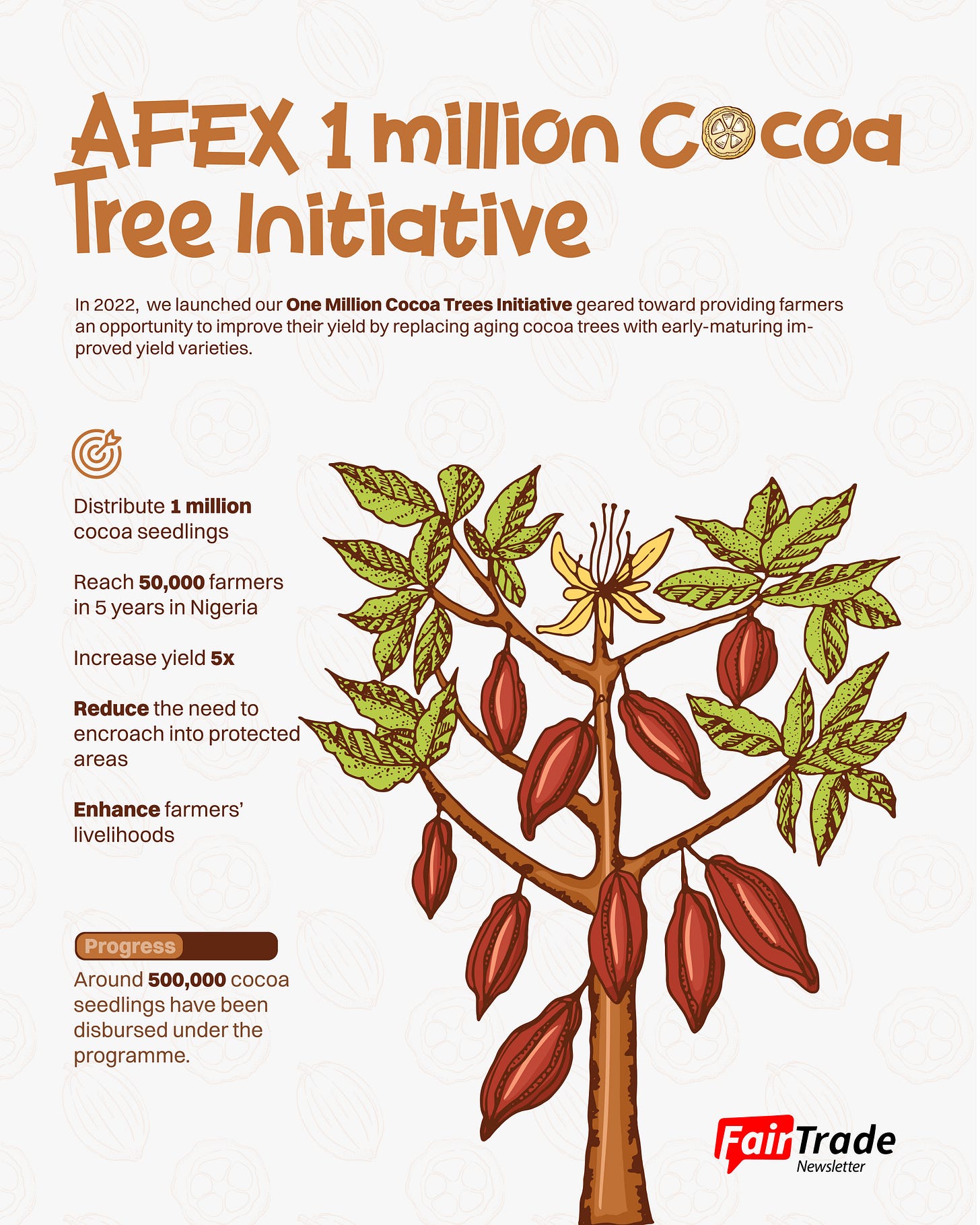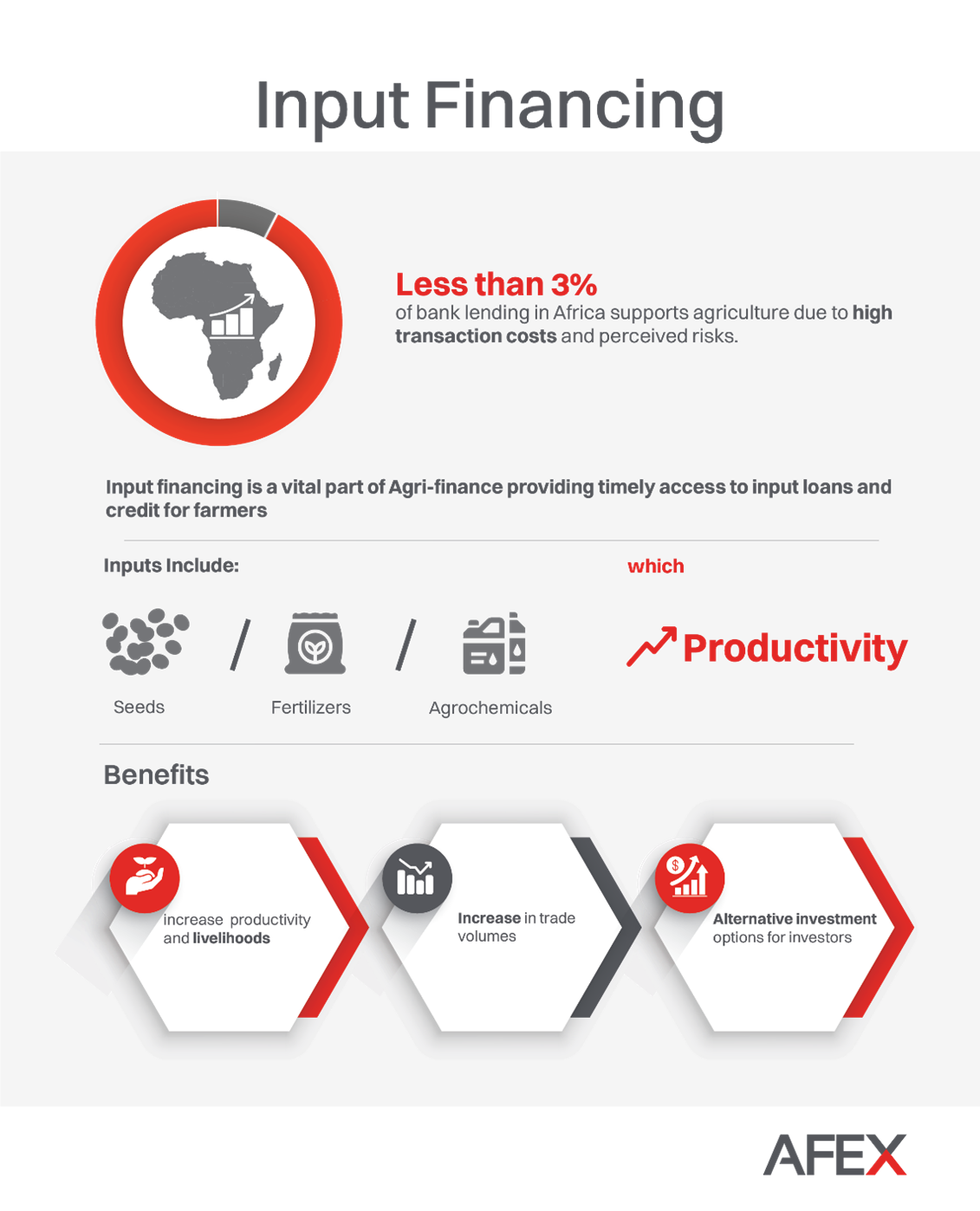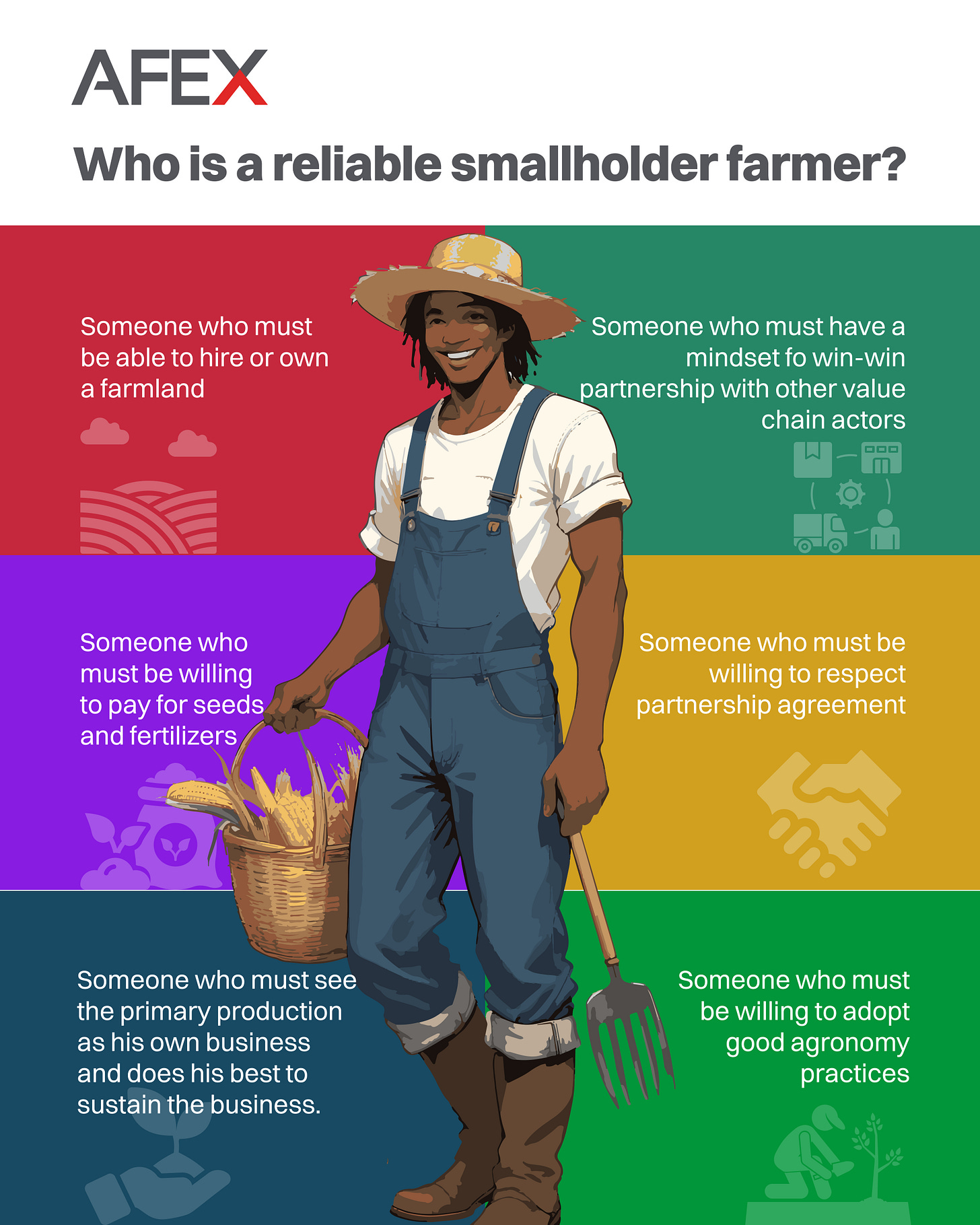You’ve probably heard of this popular Yoruba saying “ Owo ni cocoa”? – which means cocoa is big money! As someone who grew up watching cocoa build the southwestern region of Nigeria, I can testify to this statement. Cocoa used to be Nigeria’s major source of income and it has taken us far and near.
Cocoa built our universities, and our hospitals, and funded our economy in the 90s.
When you visit a cocoa-farming community in western Nigeria today, you will meet generations striving for a better life for their family. Often the parents you meet there will tell you how the cocoa farms were passed on from their grandfathers, and it was passed on to them from their ancestors. Cocoa farming for the longest time has been an investment for the future, for the farmers and the larger society.
However, the struggles cocoa farming communities face are enormous.
According to scientists at the National Oceanic and Atmospheric Administration (NOAA), cocoa will most likely be extinct by 2050. Recent disruptions in cocoa production, aging plantations, and aging farmers, particularly in West Africa, are significantly impacting the availability of this major cash crop.
Should you be concerned? Probably yes.
And I’ll tell you why in this issue. In today’s newsletter, you’ll find:
Empowering cocoa farming families for more
Opportunities to grab today in Africa’s food system
A chat with the man building a cocoa empire in Nigeria
And more.
Happy reading.
Kamaldeen Raji, Managing Director, AFEX Fair Trade Nigeria.
Spotlight
Whether it’s dark, white, or a steamy cup of coffee, there is a good chance that the sweet taste of rich creamy chocolate was made from cocoa grown in Africa. Nearly all the cocoa produced in the continent is concentrated in the Western Africa region, mainly Ivory Coast and Ghana, the world’s top two producers with a combined contribution of 62% of cocoa output. These two are followed by Nigeria (8%) and Cameroon 7%, coming after Indonesia.
Cocoa plays an important economic role for smallholder farmers and other players in the value chain. However, climate change and several other factors are putting a strain on cocoa production, raising concerns about the future. The primary threat comes from a changing climate. Cocoa trees are finicky – they thrive in specific temperature and humidity ranges. Rising temperatures and erratic rainfall patterns threaten their survival, especially in West Africa. The issues of aging cocoa plantations and a lack of young farmers entering the field further complicate matters.
A decline in cocoa production would have devastating economic consequences for these communities. Scientists are researching ways to develop climate-resistant cocoa varieties. Additionally, initiatives supporting sustainable farming practices and fair pay for farmers offer a glimmer of hope.
The future of chocolate is not set in stone. By supporting sustainable cocoa production and advocating for climate action, we can still ensure a world where everyone can enjoy this delicious treat.
Over the years, I’ve had the opportunity to speak, work, and learn from many cocoa farmers across Africa. Each individual, with a unique life story and specific relationship with farming and trading cocoa. Today, I sit with one of the leading cocoa farmers in Nigeria, where some of the world’s chocolate comes from, Rev, Mr. Ajibola Fagboyegun, CEO and Chairman, of Pey Pey Nigeria Limited.
Can you tell us a bit about your journey into cocoa farming?
I was born into the business of cocoa being a son of a cocoa buyer. I grew up with the knowledge of the cocoa business. The business operated then in a more sane environment than we have now. Back then, the quality was well controlled and the caliber of buyers was of higher integrity than now. Also, there was a more trustworthy relationship between farmers and brokers.
After my service year, I worked with my dad briefly before establishing my own business. I didn't start cocoa trade until 2018 when I added produce marketing to my existing business.
Nigerian cocoa farming faces several challenges, from disease to fluctuating prices. What are some of the biggest obstacles you’ve encountered and how did your company innovate to overcome them?
Nigerian cocoa faced a serious hike in prizes and the cocoa trees went bad due to insecticide, but my company has been able to work with the increment in prizes, and we have put serious strictness in the quality parameters hence, we scrutinize cocoa that has suffered due to insecticide.
The global chocolate industry is constantly evolving. What are your thoughts on the future of cocoa production in Nigeria?
While Nigeria ranks as the world's fourth largest cocoa producer, our output sales are in comparison to leading producers like Ivory Coast. Despite this, Nigeria plays a vital role in the global chocolate industry. Our cocoa beans are known for their excellent quality. However, challenges like low producer prices, limited access to insecticides, and difficulty maintaining farms are hindering our ability to reach our full potential. By addressing these issues, Nigeria can solidify its position as a major cocoa producer and ensure a sustainable future for our cocoa farmers.
On the other side of the spectrum, what would you do differently if you could start again today as a cocoa farmer?
That’s a deep question. I think I’ll ensure the company would establish a large-scale cocoa farm in Nigeria. We wouldn’t stop there, though. We would also invest in processing facilities within Nigeria to transform the beans into cocoa butter, cocoa powder, and other value-added products. We would also build a network of trusted individuals By providing them with fair prices and upfront financing, we can empower them to expand their operations and improve their yields.
Young people are reluctant to take over from aging cocoa farmers in Nigeria. What do you think can be done to encourage them more?
I think one of the biggest hurdles to attracting young people to cocoa farming is the lack of awareness about its potential profitability and the positive impact it can have on their lives. Additionally, poor infrastructure, with bad roads and remote locations, makes accessing and working on cocoa farms difficult. As a nation, we need to start looking into empowerment programs and incentives for young farmers while investing more in building infrastructures that work.
What is one piece of advice you would give to someone just starting in this field?
My piece of advice is that one should understand the business and have a relationship with everyone, from the farmers to the processor and one should also be conversant with everything that has to do with cocoa worldwide.
Our Activity Corner
Download our 2020 - 2024 Impact Report.
I am pleased to announce that our 2024 Impact Report is now live. This report showcases our incredible work empowering smallholder farmers in Africa, driving inclusion, and boosting productivity within the commodities ecosystem.
In 2014, AFEX was founded with an outlook to create an institution that unlocks prosperity for the continent and more precisely unlocks capital for the least served on the continent, smallholder farmers. Our earliest products and innovations were therefore designed to address the challenges faced by smallholder farmers — improving their livelihoods — while building an inclusive and efficient commodities market that would promote a fair exchange of value among the players. This initial outlook has kept us focused on improving the prosperity and resilience of smallholder farmers and rural households, ensuring that “no one is left behind”.
Within our newly released Impact Report, we have aligned our impact-oriented goal of helping Africa feed itself with the United Nations Sustainable Development Goals: No Poverty (SDG1), Zero Hunger (SDG2), Gender Equality (SDG5), Decent Work and Economic Growth (SDG8), Sustainable Consumption and Production (SDG12), and Climate Action (SDG 13).
Click here to download, read, and share the report - https://afex.africa/reports/special/afex-impact-report-2020-2024
Input Financing Season
It’s that time of the year again! The AFEX input financing program for 2024 has officially begun. With over 500,000 farmers in our network, we’re looking forward to carrying out the disbursement of inputs to smallholder farmers to help them increase their productivity and yields.
The lack of financing for farmers is a major threat to food security in Africa. One of the key aspects of our input financing program at AFEX is being able to profile farmers before unlocking finance for them. We need to know that they are good for loans that we are facilitating for them through our partnerships. Where a farmer checks all the boxes in the infograph below, we are assured that he or she will be able to secure yields that will make loan repayment a seamless process, while still leaving the farmer with enough grains left over to trade on our platform.
What we are reading
There are a lot of food system stories out there to read. These stories are a must-read.
By 2050, Africa’s population is expected to double. The current crude farming system struggles to keep pace. Could Mechanization be the savior? Maybe. Read more about it here - https://afex.africa/blog/can-mechanized-farming-save-africa-s-dwindling-food-production
This article lays out the blueprint for a thriving cocoa business - https://medium.com/the-myfarmbase-blog/how-to-start-your-profitable-cocoa-farming-business-ef922fa3a759
Dive into the heart of Africa’s agricultural revolution with this compelling story that unveils the urgent transformation of food systems across the continent. - https://theexchange.africa/industry-and-trade/african-food-systems/
African leaders pledge to triple fertilizer use in the next decade to combat declining soil health and boost food production. Read more about this new development here - https://www.devex.com/news/african-leaders-pledge-to-triple-fertilizer-use-to-improve-soil-quality-107612
We are thrilled to announce that we’ve been ranked fifth on the Financial Times’ list of Africa’s Fastest Growing Companies. Read more about our latest win here - https://businessafricaonline.com/afex-ranks-5th-on-ft-africas-fastest-growing-companies-in-2024/
Q & A segment
Q: I have a Paddy Rice farm in Zaria and I want to know how I can get fertilizers for my farm for the next planting season.
To be one of the beneficiaries of our Input Financing Program, an initiative that provides farmers with timely access to quality inputs such as fertilizers, seeds, and crop protection products, visit any AFEX warehouse closest to you in Nigeria, Kenya, or Uganda. Please note that you have to be registered with a farmer cooperative in your location, after which our Field Extension Officer (FEO) will register you on our platform for further communication.
If you have any questions, you can also contact support@afexnigeria.com for more information.
Do you have any questions about agriculture in Africa or our operations as AFEX Fair Trade? Ask away and we’ll find answers for you.
Share this email or share our signup link with a friend.
When you share this newsletter, we reach more Food system actors and empower them with valuable opportunities and stories. Thank you for being a part of our journey.
Have a great week!







